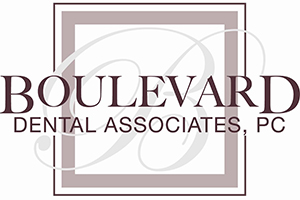
There is so much more to dentistry than drilling and filling teeth; nutrition is key in order to maintain a healthy mouth. Dentists must consider the underlying root causes of your dental issues in order to properly treat you, and your nutritional habits can be a significant underlying root cause of your dental problems. We at Boulevard Dental Associates have summarized a recent American General Dentistry Impact article by Kelly Rehan entitled, “Whole-Body Dentistry: How Nutrition Affects Oral Health” in order to better educate you on the significant effects of nutrition on your oral health.
Vitamins, minerals, and nutrients have major oral health implications. Rehan cites Jillian Kaye, MS, RDN, an adjunct clinical instructor and registered dietitian and nutritionist at New York University College of Dentistry. Kaye explains that vitamins A, B, and D, as well as calcium and phosphorous all have major oral health implications. She adds that nutrient deficiencies, primarily deficiencies of vitamins C and D and calcium, have links to periodontal disease, or a serious gum disease infection. And she says that vitamin D is particularly important because it supports the functions of calcium and phosphorus in remineralizing and strengthening the teeth. Those particularly at risk for a vitamin D deficiency are older adults, people with restricted diets (i.e., veganism or vegetarianism) and those living in places with limited sunlight, she claims. Lastly, Kaye talks about the importance of vitamin B (B2, B3, and B12) for your oral health, and she explains that because B vitamins are often all in the same foods, it is common to be deficient in all of them. Vitamin B deficiencies, she adds, are most common in older adults, alcohol users, people with restricted diets, and people with gastrointestinal issues or recent surgeries.
We’re sure you have heard about the impact of sugars on your teeth, but did you know that carbohydrates in general are a concern for the health of your mouth? Kaye explains that fermentable carbs are linked to caries (cavities). There are high-fermentable carbs (i.e., sucrose or table sugar) and there are low-fermentable carbs (i.e., lactose, or the sugar in milk), but any carb can have the same impact on your teeth, she says. Kaye does not recommend that you eliminate carbohydrates from your diet, but she does recommend that you pair them with proteins and fats, because proteins and fats digest later in the digestive system, and in this way they are less cavity-causing. They also help reduce the adherence of carbs to the teeth.
It is the frequency of exposure to carbs that is the main problem, says Amr Moursi, DDS, PhD, a professor and chair of the Department of Pediatric Dentistry at the New York University College of Dentistry, an expert also cited by Rehan. Moursi explains that bacteria in your mouth doesn’t care if the carb comes from candy or grapes. The main issue, he says, is constant snacking throughout the day, even on healthy foods like dairy, whole grains, and fruit. He says that this type of eating provides a steady diet for oral bacteria, so that even if you brush five times a day, it will still be tough to compete with the constant bathing of your mouth in carbs. In other words, according to Moursi, “How you eat plays a big, if not bigger role in your oral health than what you eat.”
Carbs definitely matter to your oral health, and so do the vitamins, minerals, and nutrients you ingest on a regular basis. We could discuss all the ways that each vitamin, mineral, and nutrient specifically impact your oral health, but our purpose here is not to get too technical. Instead, we want to promote an overall awareness of just how much your nutrition impacts your oral health. That said, we have provided a list below of the vitamins, minerals, and nutrients that impact oral health, and in what foods these can be found. If you focus on consuming a diet of these healthy foods and foods like them, your oral health will thank you for it!
Vitamins/Minerals/Nutrients that impact oral health:
• Vitamin D – egg yolks, cheddar cheese, salmon, trout, mushrooms, fortified products (milk, orange juice)
• Vitamin K – green leafy vegetables, broccoli, soybeans, pumpkin, pine nuts, blueberries
• Vitamin A – sweet potatoes, spinach, pumpkins, carrots, dairy products, cantaloupes, mangoes, red peppers
• B2 Riboflavin – yogurt, milk, chicken, beef, mushrooms, cheese, chicken, eggs, quinoa, fortified breakfast cereals
• B3 Niacin – chicken, turkey, salmon, tuna, beef, brown and white rice, peanuts, potatoes, fortified breakfast cereal
• B6 Pyridoxine – chickpeas, tuna, salmon, chicken, turkey, bananas, potatoes, fortified breakfast cereals
• B12 Cyanocobalamin – clams, tuna, salmon, beef, yogurt, milk, cheese, fortified breakfast cereals
• Folic acid – spinach, asparagus, brussel sprouts, white rice, avocados, fortified breakfast cereals
• Calcium – dairy products, tofu, salmon, beans, kale, broccoli, fortified breakfast cereals and orange juice
• Phosphorus – dairy products, beef, salmon, chicken, lentils, potatoes, rice
Reference:
Rehan, Kelly. Whole-Body Dentistry: How Nutrition Affects Oral Health. AGD Impact. May 2022; 13-17.
